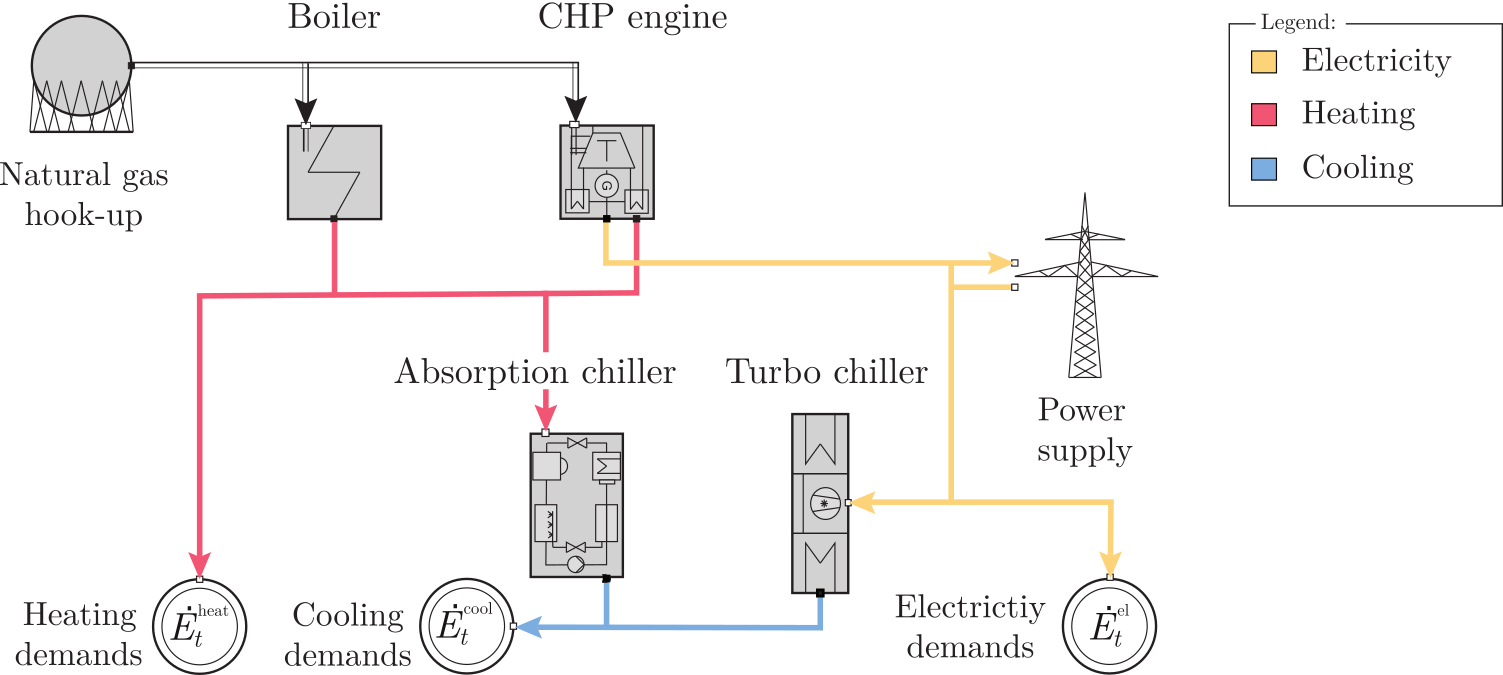Decentralized Energy Supply Systems

Decentralized energy is produced close to where it will be used, rather than at a larger, centralized plant and sent through the national grid. This local generation enables reductions of transmission losses and carbon emissions as well as an increase of supply security. The application of Decentralized Energy Supply Systems (DESS) encompasses, e.g., chemical parks, hospitals or research complexes. Since energy costs usually match the costomers profits in magnitude, optimally designed DESS can lead to a considerable increase of profits. DESS are highly integrated and complex systems due to the integration of different energy forms and the connection to energy consumers as well as the gas and electricity market. The target of optimal synthesis of DESS is the identification of an (economically) optimal structure (Which types and how many components?) and optimal dimension (How big?), while simultaneously considering the optimal operation the the selected components (Operate which component ar which level at what time?). This three decision-levels could be considered sequentially. However, the three levels influence each other, thus only a simultaneous optimization will find a global optimal solution for synthesis of DESS. DESSLib provides benchmark instances for the synthesis of decentralized energy supply systems. The instances are based on real world data. Each instance consits of economic parameters, nonlinear performance models for energy conversion components and a variety of superstructures and energy load cases. DESSLib is one result of the interdisciplinary research project Deterministic Optimization of Industrial Energy Systems by Chair of Technical Thermodynamics, Lehrstuhl II für Mathematik, and Operations Research at RWTH Aachen University. The project and research was funded by the Excellence Initiative of the German federal and state governments.
Mathematical Optimization of Decentralized Energy Supply Systems
Information about the optimization problem for optimal synthesis of decentralized energy supply systems, including its desicions, constraints, and a objective, is given in our report:
Benchmark Instances
All benchmark instances of DESSLib can be downloaded as well as a documentation of the data files.
- DESSLib benchmark instances [zip]
- Documentation: DESSLib - Benchmark Instance Structure, Component Models and Parameters [pdf]
Feel free to use data of DESSLib - please cite our report [pdf], BibTex entry [bib] and let us know.
Related Work
- Computational results [csv] of Goderbauer et al. (2016), An Adaptive Discretization MINLP Algorithm for Optimal Synthesis of Decentralized Energy Supply Systems [1]
Feel free to use data of DESSLib - please cite our report [pdf], BibTex entry [bib] and let us know.
Changelog
| 08/Sept/2016 | paper [1] is accepted for publication in Computers & Chemical Engineering, Vol 95 |
| 06/Sept/2016 | add computational results of paper [1] |
| 16/Feb/2016 | first version of DESSLib Homepage online |
Literature
-
An Adaptive Discretization MINLP Algorithm for Optimal Synthesis of Decentralized Energy Supply Systems.Computers & Chemical Engineering, Volume 95 (Dec 2016), pp 38-48
-
Automated Optimization-Based Synthesis of Distributed Energy Supply Systems.PhD thesis, RWTH Aachen University (2013)
-
Automated superstructure-based synthesis and optimization of distributed energy supply systems.Energy 50 (2013), 374–388.
Contact
If you have any questions concerning DESSLib, constructive remarks or
new data, please contact Björn Bahl (bjoern.bahl




